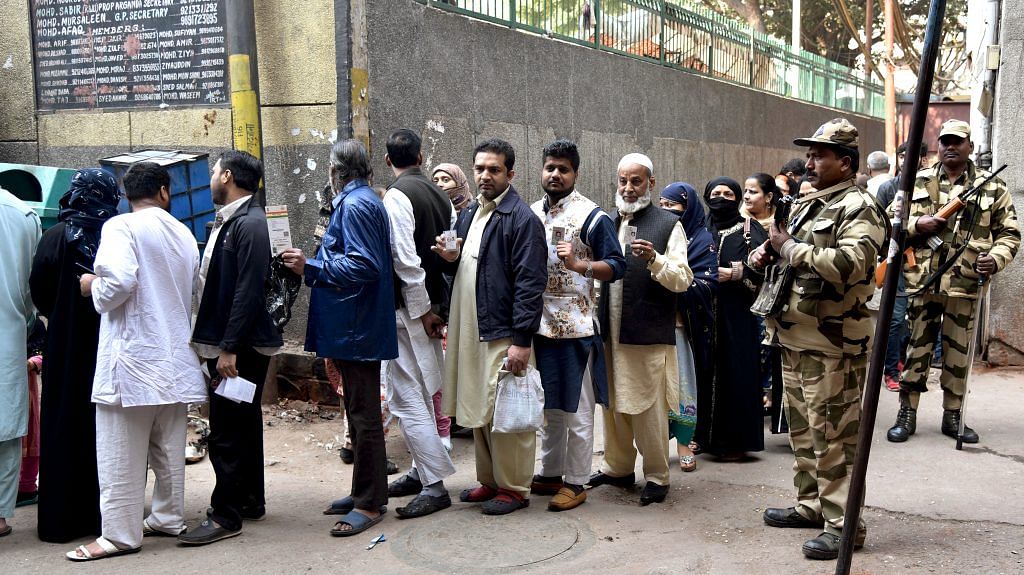For years, Muslim voters were cast as a monolithic bloc, often accused of voting on the directions of religious leaders – being a “votebank”. Then political analysts began characterising Muslims as unexceptional, wanting the same things as Hindus, and therefore no different from anyone else as voters.
But both narratives are flawed and incomplete, and the recent Delhi election results show that. Muslims do want to materially improve their lives, like anyone else, but they are willing to build alliances against those in whom they see their biggest enemy: the Bharatiya Janata Party (BJP).
Also read: No, Delhi election wasn’t just about ‘development vs communalism’. That’s lazy analysis
Certainly, Muslims largely give the same answers in opinion polls as Hindus do. Answers that can mask the complex decision matrix that governs vote choice. Looking at 15 years of data from Lokniti-Centre for the Study of Developing Societies’ (CSDS) election studies, political scientists Rahul Verma of the Department of Political Science at Berkeley University and Pranav Gupta of Lokniti-CSDS found that the self-reported biggest priorities of Muslims in Uttar Pradesh were no different from that of any other major community in the state, in an article for the Economic & Political Weekly in December 2016.
This appears to be the case in Delhi too where, on the face of it, Hindu and Muslim voters said that the same things mattered to them.
Yet we know that Delhi voters were aware of the Shaheen Bagh protests (80% of voters said they were aware of it in Lokniti-CSDS’ election-eve survey), and Hindus in India supported the CAA while Muslims largely opposed it (as of CVoter’s December 2019 poll).
And then, there is this piece of evidence from the India Today-Axis My India exit poll: “When asked about the reason for voting in favour of the Aam Aadmi Party (AAP), the Muslim voters said it was on account of its winnability against the BJP. In other words, the Muslim voters of Delhi voted for the AAP because they felt it was better poised to defeat the BJP in comparison to the Congress,” the Axis pollsters said.
“In states where the Congress and the BJP are the principal players such as in Rajasthan, Gujarat, and Madhya Pradesh, Muslims have no real choice — they overwhelmingly vote for the Congress. The Muslim support for the Congress goes down in states such as Andhra Pradesh and Assam, where there is a third option. So also, in Kerala and West Bengal, where the BJP or its allies are not real competitors. Thus, the nature of political competition and the range of choices available within a state determine the consolidation or fragmentation of Muslim votes,” Verma and Gupta wrote in their 2016 article.
Also read: A lesson BJP won’t learn from Delhi election: To not polarise Bihar and West Bengal
Since 2014, voters have become increasingly polarised on religious lines, with the 2019 Lok Sabha election representing the most communally polarised election ever, Lokniti-CSDS researchers Shreyas Sardesai and Vibha Atri argued in an article after the 2019 verdict.
Delhi, it would now appear, is the latest example of this strategic voting. Turnout was highest in the state’s Muslim-dominated constituencies, indicating a greater degree of politicisation and mobilisation.
Also read: India shall be remade through demographic change, street by street
When Hindu voters, particularly those belonging to the upper castes, say that they vote for development, it does not mean that they do not strongly believe in Hindutva issues, and hence, the BJP. Similarly, Muslim voters who say they want development can also vote for a party best poised to keep the BJP out.
The author is a Chennai-based data journalist. Views are personal
